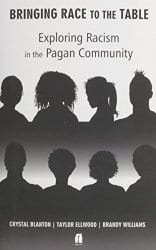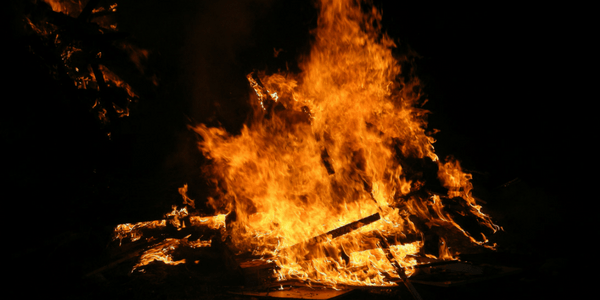
 Bringing Race to the Table: Exploring Racism in the Pagan Community, edited by Crystal Blanton, Taylor Ellwood, and Brandy Williams
Bringing Race to the Table: Exploring Racism in the Pagan Community, edited by Crystal Blanton, Taylor Ellwood, and Brandy Williams
Megalithica Books, 9781905713981, 295 pp. (incl. author biographies), 2015
A striking collection of essays, current and diverse, Bringing Race to the Table: Exploring Racism in the Pagan Community is a work of dedication and power. Crystal Blanton, author, editor of two previous books on the topic of diversity, Patheos blogger, Wild Hunt contributor and social worker — in addition to a priestess and witch — delivers a must-read text in conjunction with her two coeditors, Taylor Ellwood and Brandy Williams.
Blanton does a stellar job showcasing voices from many perspectives. The diverse authors of the essays come from across the lines of gender, race, socio-economic class, spiritual practise, and education. Bringing Race to the Table makes room for many rarely discussed viewpoints, even in advanced circles or books. This makes for a full spectrum and undeniable look at the built-in mechanisms of discrimination that have followed so many of us from the overculture into Paganism. The calling-out and of racist, sexist, gendered, and classist behaviour is one string in the fabric Blanton weaves. Another is the choice to not perpetuate these actions in our own lives, but to turn toward the struggles many of our brothers and sisters live with daily.
I love the format Blanton and her coeditors haven chosen. Three sections outline the experiences of people of colour, the historical context of racism within Paganism, and how to overcome those and be a real ally. Representation, proper understanding of cultures of colour and identification of privileges are a great start but not enough. More so, is the real need to make our differences a topic of discussion and the opportunity to enrich all of our magical experiences. It is not enough to worship an ancient Egyptian deity in a public rite if, in fact, the altar image used is of a white Aset. Representation is a vital aspect of a culture’s, gender’s, or body’s validity. Reading these experiences heightened my personal drive to actively embrace the myriad faces not only of deities, but of humanity. Many essays challenge the status quo of perceived culture.
We then move on to the historical and mythological racism found throughout Pagan traditions, habits, and practices. This section provides much-needed context for the rites and rules, hierarchies, and coded language within many Pagan paths. These racist sentiments may not be intended to harm, but that in no way excuses anyone from continuing to support them. This can include assuming all people of colour will only work within “their” culture’s paths, but also heteronormative, culturally elitist, and economically-based discrimination. Ending with a section describing how allies can help, shows a full circle approach to combating racist actions from within our own spheres of power. Rather than waiting for a top-down approach from enforced laws and social mandates, we must create the world we know can exist by not reinforcing racist actions within our community and speaking out against them when they occur.
A few thoughts from this book really stand out — specifically the concept of an obligation to one’s path to take responsibility and change the reach of institutionalized discrimination. Those who summon elements, and work with or for deities can surely change racist actions in and around themselves. It is not enough to say “we all come from the Goddess…” and create a festival, classroom, or group environment in which racist systems endure from the larger culture and structure systems.
Womanism gifts many powerful concepts to this conversation. The future of the disenfranchised, ostracized, poor, remote and differently knowledged peoples relies on accessibility to renewable energy, foods with nutrition, and the other basic needs many lack before they can afford tickets to festivals and dues to a coven. These must also coincide with the widespread use of renewable resources, farming and ecologically sound modes of travel, production and commerce. This social-justice-meets-environmentalism is the crux of change, a brilliant way to understand how this conversation relates to the occult circles and the respect many Pagans claim they have for the planet, as Gaia or otherwise.
Modernity, including our own racist, misogynistic, sexist, and anti-queer power structures and ritual systems accept the norms of a stratified and segmented society. This translates into non-inclusive circles, unspoken whites-only spaces, and the assumptions that people of colour and queer folks do not want to be a part of Paganism. This is utterly untrue, as Bringing Race to the Table shows. Throughout much of my reading, I was reminded of the “Charge of Aradia,” a controversial text in its own right, and the one that cemented my personal path. “And ye shall all be freed from slavery, / And so ye shall be free in everything”1 is a mandate from the closest thing we witches may have to a religious text: to be free of the constraints society enforces on us. It is a charge to create a life of respect and personal responsibility.
Blanton’s work has always highlighted the need to approach witchcraft and Paganism radically and I believe it is in its roots. Other interpretations would seek to limit the influence and power we co-create in ritual space. By embracing a truly human viewpoint of Paganism, we can truly all be free to be Pagan, and not use the limited approach that a white heteronormative Paganism would assume.
Covens, groves, school groups, event planners and festival-goers, academics and occult book store owners and even solitaries, of all ages, creeds and varieties can benefit greatly from reading Bringing Race to the Table and applying its messages. This is necessary not only in practise, but in all aspects of our lives. Unifying many of the voices shared in the anthology is the need for solidarity and the admittance that Pagans as a collective (no matter how loose) can do better in this challenge and may even have a spiritual obligation to do so.








